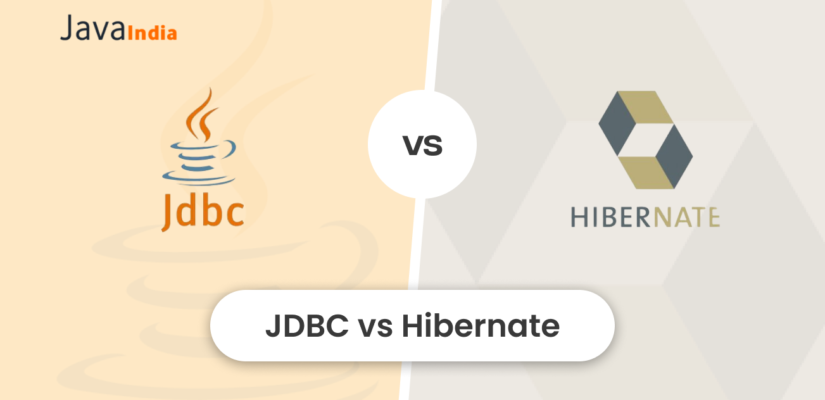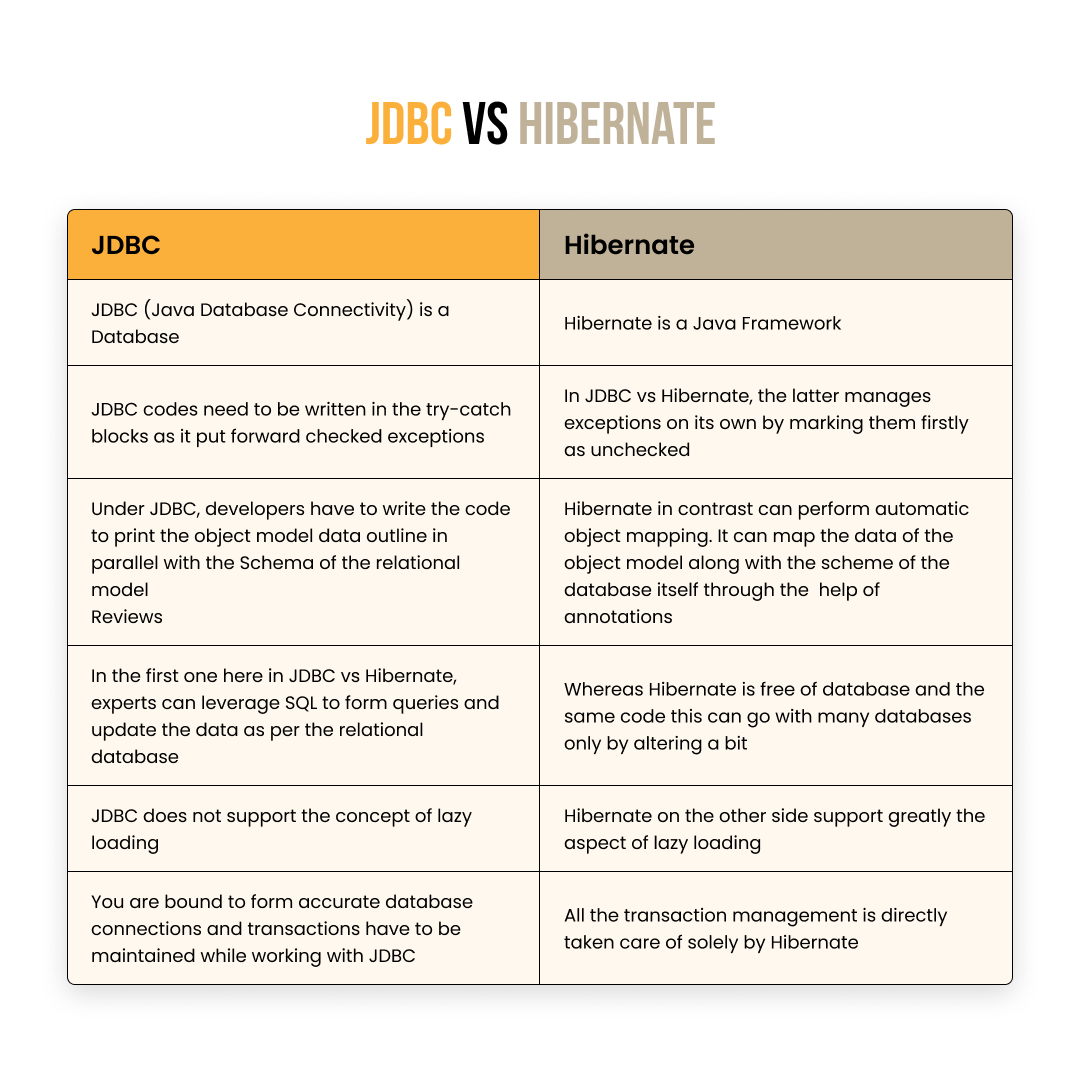
JDBC Vs Hibernate: Which Will Perfectly Aligned With Your Business?
Do you have any idea about which one is superior in the battle of JDBC Vs Hibernate? Well, it’s a rising dilemma as to which one to choose between the two. It is because of the popularity of these two tools that comes in handy when anyone opts for Java to form a website that can reflect dynamicity.
No matter what you choose by making up your mind, it depends on what you want and what your project demands. But to scrape the most out of the chosen one, you first need to be completely familiar with the differences between JDBC & Hibernate. If you are tangled in the dilemma of JDBC vs Hibernate, you land at the right place without any doubt.
In this blog, we will begin by first looking at what is JDBC and Hibernate along with their features to make you understand each in particular. After this, we’ll see the difference between the two. And, finally, take on as to which one to choose for your web application development. So, let’s begin!
JDBC vs Hibernate: A Light On Separate Explanation
Firstly, let’s shed light on JDBC to know each facet of JDBC like the working process, architecture, features, and meaning in general.
All About JDBC (Java Database Connectivity)
What is JDBC?
JDBC stands for Java Database Connectivity (JDBC). It is an open-source web application programming interface for Java. It enables the developers to fulfill the purpose of Java Web Application Development to create queries and update a particular database using SQL (Structured Query Language).
Java Database Connectivity features a library for APIs to connect the application to several databases, create SQL or MySQL, execute queries in the app, and view & modify results accordingly.
Step-by-Step Process of JDBC
Nothing will become possible at all if you don’t how to move ahead, here comes the working procedure in the picture. Apply the steps as highlighted here.
- It opens a database connection for the web application
- It sends SQL queries to the database using the JDBC driver
- It then connects the JDBC driver to the database
- Execute queries to get desired results
- Send data to the application
- It processes the data when the results are returned
- In the final stage, it closes the connection
JBDC Architecture
The primary aim of JDBC is to make interactions with Relational Database Management Systems (RDMS) as quickly as well. It follows the following two architectures:
- JDBC driver connects to the database before executing SQL statements.
- JDBC uses the ODBC driver to execute SQL queries.
JDBC’s Features To Note
Knowing about JDBC will not be completed until and unless you take a deep dive into the features of the same.
- Provides an unmatched level of portability
- Gives direct access to each query available from the database
- Supports commendably data types such as BLOB, CLOB, etc
- Sending a wide array of updates to the database (batch updating) is effortless
- It is quite compatible with Java Applets, Java Server Pages (JSPs), Java Servlets, and Enterprise JavaBeans (EJBs).
Everything To Know About Hibernate
What is Hibernate?
Hibernate also helps to connect Java web applications with different databases but in a unique approach. It is an open-source object-relational mapping (ORM) tool for Java developers to use the Java ecosystem. The object relationship library of Hibernate maps the tables and columns of the database in collaboration with Java
Step-By-Step Working Flow of Hibernate
The process of doing something is quite crucial and unless you are not familiar with the procedure, you can’t perform anything. So, here is the step-by-step guide given to you.
- Unlike JDBC, Hibernate connects with the database on its own and uses Hibernate Query Language (HQL) to execute the queries and bring results to the Java object.
- The results are mapped and given in Hibernate configuration.
- The database is connected to the web application using the session.
Hibernate Architecture
The architecture of Hibernate works on a single flow. Hibernate connects to the database and modifies each HQL statement into the database-specific thing. It then maps the queries to Java objects that are further accessed and used by Java applications.
Eminent Features of Hibernate
Is Hibernate new for you? Develop a deep level of familiarity with Hibernate by knowing all about the same through its features.
- It is open-source and lightweight
- Possessing high productivity and portability
- Able to begin the creation of the table automatically
- Offer the information regarding database status and statistics of query
- Permit for strong data manipulation with less coding
So, now you get an idea of what is JDBC vs Hibernate. Next is to look at the following points showing JDBC’s superiority over Hibernate and vice versa.
JDBC vs Hibernate: Which One To Choose from This?
The debate will surely go a long way and choosing one out of JDBC vs Hibernate is quite complex. To clear out your delusion, move further to dive into this section.
Reasons for Choosing JDBC Over Architecture
Easy to Learn
JDBC is much easier to learn by developers as compared to Hibernate. Developers need not spend a hefty amount of time learning an application functioning when it comes to JDBC.
Simple Solution
If you have the only requirement of storing the data in the database without mapping to two or more tables, the JDBC is to be considered. It is best used for straightforward database management rather than relying on a more complex Hibernate.
Fast Development & Testing
The startup performance of a web application matters a lot. In the case of Hibernate, it does not showcase a good performance and takes around 10-15 seconds to pre-cache even a small application.
On the other side, JDBC does follow the same set of lag as compared to Hibernate. It loads pages in a much faster way. It helps to insert multiple queries into a single jQuery, while Hibernate follows the complex process of inserting statements into different tables and columns.
Optimum Support
JDBC offers optimum technical support under the wing of Oracle Corporation. It means developers will get constant support from dedicated customer service all the time. Also, there is a whole lot of learning material available on the internet that allows developers to know anything about JDBC swiftly.
Reasons to Pick Hibernate over JDBC
Independence of Database
Hibernate makes it possible to do mapping between tables and the app through XML files. Therefore, shifting or the act of migration to a new database becomes uncomplicated if the need for the same emerges.
Automatic Object mapping
In comparison of JDBC vs Hibernate, the latter is capable of automatic data mapping. It is also known as “Transparent Persistence”. With this, you can map database tables with application objects during the interaction with RDBMS.
Contrastingly, programmers or experts belonging to JDBC have to do the coding to deal with this issue which is too time-consuming or demanding.
JDBC vs Hibernate: Differences Worth To Pay Attention
Here is the table given for your reference to help you understand the difference between JDBC vs Hibernate. Go through this table to clear all the doubts you have regarding the divergence between Hibernates and Java Mobile App Development. 
Final Thoughts!
The debate of JDBC Vs Hibernate will continue with the recent developments in technologies. Here, you might get an idea of the differentiation between the two. Enterprises looking to build interactive and straightforward web applications should always go for JDBC as compared to Hibernate. And, to avail the same you can get in touch with JavaIndia, as a leading Java Development Company having years of successful expertise and a wide customer base.
FAQs (Frequently Asked Questions)
Q. What is JDBC?
The full form of JDBC is Java Database Connectivity. It is the Java API that helps to connect to the database, issue queries and commands, and also handle results set acquired from the database. JDBC extracts the queries using the technical support of SQL (Structured Query Language).
Q. What is the Use of JDBC in Web Applications?
JDBC is helpful in a web application to establish a connection with the data source, send queries, and update statements to the data source accordingly. Also, Hire Java Developers to execute the functionalities of JDBC within the web application at a competitive price.
Q. Which one is better: JDBC vs Hibernate?
JDBC offers an unexpected level of performance and on the other hand, there is a full bag of benefits exists to go with Hibernate. To know about JDBC vs Hibernate, take a deep dive into this write-up.
Q. What is the Cost of Java Web Application Development Services?
The estimated cost of availing Java web application development services from JavaIndia relies on your business requirements. Since every single enterprise has different business objectives to fulfill via a web app. Thus, features, size, composition, and development complexities are first taken into consideration to decide the final service price.
Q. Is it possible to use Hibernate without JDBC or Java Mobile app development?
Hibernate is not capable of eradicating the need for JDBC at all. When you make use of Hibernate, all the interactions within the database still happen or happen with the JDBC APIs. Hibernate along with JPA mainly come into existence depending on the JDBC API.

